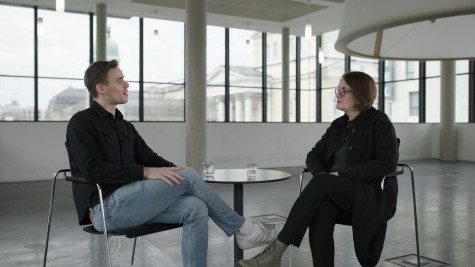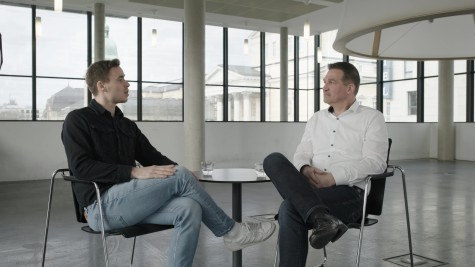-
![Energiezentrale am Standort Lichtwiese, im Vordergrund eine Straßenbahnhaltestelle]() Picture: Jannik Hoffmann
Picture: Jannik Hoffmann![Energiezentrale am Standort Lichtwiese, im Vordergrund eine Straßenbahnhaltestelle]() Picture: Jannik Hoffmann
Picture: Jannik HoffmannSustainable energy saving: TU Darmstadt once again draws a positive conclusion
2025/05/08
Last winter, TU Darmstadt once again succeeded in stabilizing its energy consumption at a reduced level. Compared to the baseline period before the energy price crisis in 2022, all members of TU collectively saved around 17% heat in the 2024/25 heating period, adjusted for weather conditions. Electricity consumption fell by almost four percent compared to the baseline period.
-
![]()
![]()
TU receives first LEAF certifications for sustainable laboratories
2025/02/11
Potential zum Energiesparen nutzen
At TU Darmstadt, four working groups from the Departments of Chemistry and Biology have been awarded so-called “LEAF certificates” for more resource-efficient laboratory operations. With these quality seals, the TU is a pioneer in Hesse.
-
Energieverbrauch der TU 2024 auf dem Niveau des Vorjahres
2025/01/23
Die TU Darmstadt hat ihren Energieverbrauch 2024 auf dem Niveau des Vorjahres stabilisiert. Der absolute Verbrauch an Wärme und Strom lag nach Angaben des Energiemanagements um jeweils etwa zwei Prozent über dem von 2023. Im Vergleich zum Basiszeitraum – dem Jahr vor der Energiepreiskrise (Juni 2021 bis Juni 2022) – war der Verbrauch jedoch bei der Wärme absolut um 27 Prozent und beim Strom um sechs Prozent geringer.
-
![]()
![]()
Interview: TU Vice President Martin Lommel on the energy situation in 2024/2025
2024/12/04
-
![]() Bild: TU Darmstadt /Sandra Junker
Bild: TU Darmstadt /Sandra Junker![]() Bild: TU Darmstadt /Sandra Junker
Bild: TU Darmstadt /Sandra JunkerGemeinsam Energie sparen: TU Darmstadt verbucht erneut positive Bilanz
2024/06/21
Rückgang um 18 Prozent bei Wärme und sechs Prozent beim Strom
Auch im zweiten Winter seit Beginn der Energiepreiskrise Anfang 2022 hat die TU Darmstadt wieder erfolgreich ihren Energieverbrauch verringert. Im Vergleich zum Basiszeitraum vor der Krise sparten alle Mitglieder der TU gemeinsam in der Heizperiode 2023/24 rund 18 Prozent Wärme ein, prognostiziert worden waren zuvor 15 Prozent. Absolut betrachtet sank der Wärmeverbrauch um rund 31 Prozent. Beim Strom konnten absolut rund sechs Prozent eingespart werden. Damit wurden die Einsparziele des Landes Hessen für die vorangegangene Heizperiode 2022/23 (15 Prozent Wärme und fünf Prozent Strom) erneut erreicht.
-
![Energiezentrale am Standort Lichtwiese, im Vordergrund eine Straßenbahnhaltestelle]() Picture: Jannik Hoffmann
Picture: Jannik Hoffmann![Energiezentrale am Standort Lichtwiese, im Vordergrund eine Straßenbahnhaltestelle]() Picture: Jannik Hoffmann
Picture: Jannik HoffmannHeating for TU buildings – and more
2024/04/17
Facts and figures on the university's own district heating network
A total of 102 TU Darmstadt properties on the city center campus, Botanischer Garten, Lichtwiese and the university stadium are connected to the TU's own district heating network.
-
![Prof. Dr.-Ing. Matthias Weigold]() Bild: PTW/TU Darmstadt
Bild: PTW/TU Darmstadt![Prof. Dr.-Ing. Matthias Weigold]() Bild: PTW/TU Darmstadt
Bild: PTW/TU DarmstadtKlimaneutrale Produktion für nachhaltige Industrie
2024/03/26
LOEWE-Transfer-Professur für TU-Professor Matthias Weigold
Professor Matthias Weigold von der TU Darmstadt erhält eine der vier ersten, neu vom Land Hessen eingerichteten LOEWE-Transfer-Professuren. Die Professur „Klimaneutrale Produktion“ wird über fünf Jahre gefördert, beantragt wurde eine Fördersumme von knapp einer Million Euro. Ziel des Pilotprojekts Transferprofessur ist es, Forschungsergebnisse und Innovationen aus dem Themenspektrum der Energie- und Ressourceneffizienz sowie Energieflexibilität gezielt an die Industrie, die wissenschaftliche Gemeinschaft, Studierende, politische Entscheidungsträger:innen und die Zivilgesellschaft zu vermitteln.
-
![Bianca Schell und Professor Nico Bruns]() Bild: Nico Bruns
Bild: Nico Bruns![Bianca Schell und Professor Nico Bruns]() Bild: Nico Bruns
Bild: Nico BrunsSchritt für Schritt zum nachhaltigen, ressourcenschonenden Labor
2024/03/25
Interview mit Bianca Schell und Professor Nico Bruns
Nico Bruns ist Professor für „Nachhaltige Funktionale Polymere“ an der TU Darmstadt. Er leitet zudem die „Initiative Nachhaltige Labore“ des Fachbereichs Chemie. Neben dem „Was geforscht wird“, ist ihm das „Wie geforscht wird“ besonders wichtig. Denn bis zu 70 Prozent des Energiebedarfs einer Universität entfallen auf die Labore. Auch Bianca Schell, Doktorandin im Team Bruns, beschäftigt sich mit dem Thema nachhaltiger Laboralltag. Die drei Hauptthemen ihrer Promotion: Energiesparen, Müll und Recycling sowie Nachhaltigkeitsinitiativen. Im Interview sprechen Schell und Bruns über die Initiative ihres Fachbereichs sowie die ersten LEAF-Zertifizierungen an der TU Darmstadt.
-
![Ein Krafttwerk mit rauchenden Schloten im Sonnenuntergang]() Bild: Adobe Stock / Zsolt Biczó
Bild: Adobe Stock / Zsolt Biczó![Ein Krafttwerk mit rauchenden Schloten im Sonnenuntergang]() Bild: Adobe Stock / Zsolt Biczó
Bild: Adobe Stock / Zsolt BiczóWärmenetze der Zukunft intelligent geregelt
2024/03/21
Verbundprojekt „EnEff:Wärme – MeFlexWärme“
Das Verbundforschungsprojekt „EnEff:Wärme – MeFlexWärme“ unter der Leitung von Professor Florian Steinke, Fachbereich Elektrotechnik und Informationstechnik (etit) der TU Darmstadt wurde im Dezember 2023 nach vier Jahren Projektlaufzeit abgeschlossen. Das Projekt beschäftigt sich mit dem Thema, wie sich zukünftige Fernwärmenetze im Rahmen der Energiewende optimal betreiben lassen.
-
![]()
![]()
Video interview with David Sauerwein from Energy Management
2024/03/01
Episode 3 of the video series on saving energy at TUDa
How has TU Darmstadt responded to the energy crisis since 2022? How does it intend to save energy in the long term? And what are the biggest challenges when it comes to renovating buildings? Presenter Joscha Reber (Research Associate at the Department of Civil and Environmental Engineering) discusses these and other questions with David Sauerwein from Energy Management in the third and final episode of our video series.
-
![]()
![]()
Video interview with Ulrike Liebig from construction management
2024/02/23
Episode 2 of the video series on saving energy at TUDa
What challenges does the TU face when renovating listed buildings and how does it deal with them? How many of the university's buildings are listed? In the second episode of our video series, presenter Joscha Reber (research assistant at the Department of Civil and Environmental Engineering) explores these and other exciting questions in conversation with Ulrike Liebig from Construction Management.
-
![]()
![]()
Video interview with Stefan Alraum from Energy Management
2024/02/16
Episode 1 of the video series on saving energy at TUDa
What is TU Darmstadt doing to advance the energy transition? What special challenges are associated with the energy-efficient refurbishment of historic buildings? How does the university intend to save energy in the long term and thus reduce emissions? Our new three-part video series provides answers to these questions. In episode 1, presenter Joscha Reber (research assistant at the Department of Civil and Environmental Engineering) talks to Stefan Alraum from Energy Management about the energy transition.
-
![Ralf SImon, Stellvertretender Direktor und Energiebeauftragter des Unisport-Zentrums, an seinem Arbeitsplatz.]() Picture: USZ
Picture: USZ![Ralf SImon, Stellvertretender Direktor und Energiebeauftragter des Unisport-Zentrums, an seinem Arbeitsplatz.]() Picture: USZ
Picture: USZ“Sometimes it's a bit like detective work”
2024/01/31
Interview with Eric Maercker from Energy Management
Eric Maercker is working on reducing the TU's energy consumption and paving the way for a CO₂-neutral university. In an interview, the 39-year-old explains, among other things, how the TU is supplied with energy and what his most urgent tasks are at the moment.
-
![Eric Maercker arbeitet in einem Energieschaltraum]() Picture: Klaus Mai
Picture: Klaus Mai![Eric Maercker arbeitet in einem Energieschaltraum]() Picture: Klaus Mai
Picture: Klaus Mai“Sometimes it's a bit like detective work”
2024/01/23
Interview with Eric Maercker from Energy Management
Eric Maercker is working on reducing the TU's energy consumption and paving the way for a CO₂-neutral university. In an interview, the 39-year-old explains, among other things, how the TU is supplied with energy and what his most urgent tasks are at the moment.
-
![Die Energiebeauftragte der Hochschuldidaktischen Arbeitsstelle (HDA): Diana Seyfarth]() Bild: Klaus Mai
Bild: Klaus Mai![Die Energiebeauftragte der Hochschuldidaktischen Arbeitsstelle (HDA): Diana Seyfarth]() Bild: Klaus Mai
Bild: Klaus Mai„Jeder kleine Beitrag zählt“
2024/01/15
Diana Seyfarth ist Energiebeauftragte der Hochschuldidaktischen Arbeitsstelle (HDA)
In der HDA ist Diana Seyfarths Schwerpunkt „Wohlbefinden und Gesundheit in Studium & Lehre“. Im Interview erklärt die 46-jährige Diplom-Pädagogin, warum und in welcher Form sie sich zudem als Energiebeauftragte engagiert.
Past announcements on the energy situation
Past announcements on the energy situation


























